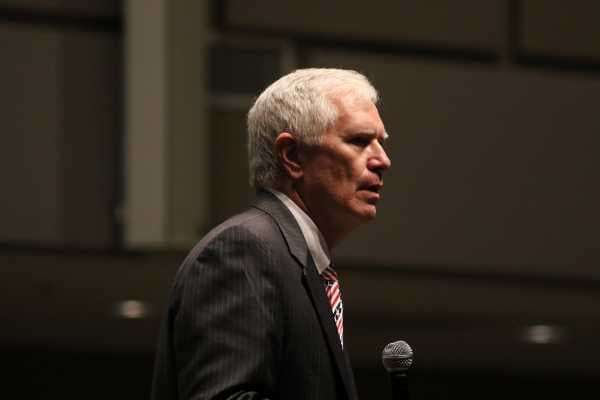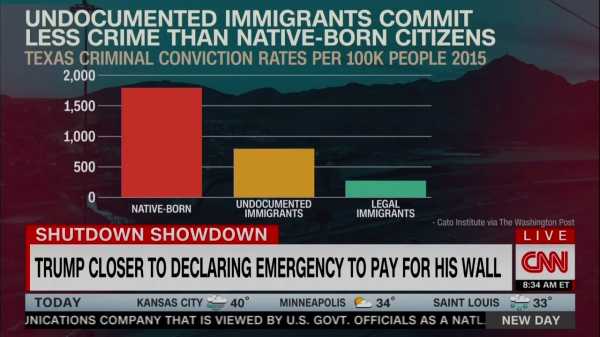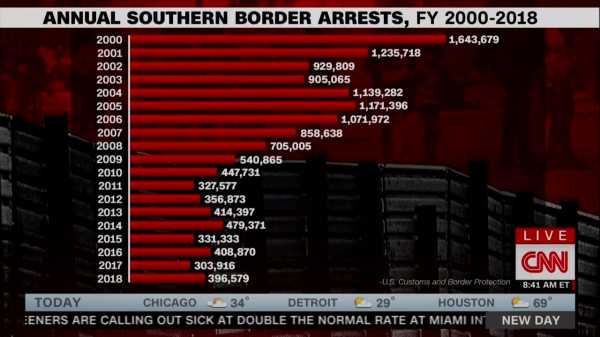
Rep. Mo Brooks (R-AL) is totally supportive of President Donald Trump’s border wall, including the possibility that Trump will declare a national emergency in hopes of building it without congressional approval. But during a CNN interview on Friday, Brooks revealed that his position, like Trump’s, isn’t rooted in the facts.
Over the course of a number of heated exchanges with host John Berman, Brooks flatly denied data and research undercutting claims that are central to the case he and the president are making on behalf of the wall.
Brooks, echoing claims Trump made during his factually challenged Oval Office speech on Tuesday night, argued that a wall along the southern border is needed to prevent drugs from entering the country, as well as to prevent crime committed by undocumented immigrants. But host John Berman pushed back — with receipts.
“Yes, the predominant amount of heroin does come over the southern border, but the vast majority of it comes at ports of entry,” Berman said. “Number two — you said, ‘There are those people who died at the hands of undocumented immigrants.’ Let me put up this chart.”
Berman’s producers displayed the following chart, which, using data from the libertarian Cato Institute, shows that undocumented immigrants commit crimes at lower rates than native-born Americans. (The Cato study is far from the only one to arrive at this conclusion.)

“The crime rate among undocumented immigrants is actually less than—” Berman continued. But before he could finish his sentence, Brooks angrily cut him off.
“That’s false. That’s false,” Brooks said. “I have looked at those studies, and you want political propaganda, you go ahead and use it!”
That wasn’t the only time during the interview that Brooks flatly rejected data that cuts against the narrative he and Trump are pushing — one that rests on false premises about the impact a border wall would have on stopping drugs from entering the country and preventing crime.
Later, Berman highlighted another graphic suggesting that the number of unauthorized border crossings has in fact steadily declined over the past decade — a trend at odds with Trump’s insistence that the situation along the southern border constitutes an unprecedented crisis possibly warranting a national emergency declaration.

Once again, however, Brooks was having none of it.
“I disagree with that data you have thrown out there,” he said, without specifying what exactly he disagreed with.
Watch the interview for yourself here:
Brooks also said he would support Trump if he declares a national emergency in an attempt to build the wall without congressional approval, even though he signed an amicus brief in 2015 that criticized then-President Barack Obama’s use of executive authority.
“This is not a partisan issue,” Brooks wrote back then. “When one branch of the government unconstitutionally usurps the power of another, it affects all Americans, because it threatens the very core of our system of checks and balances that has served our government, and America, so well for so long. If the president can unilaterally ‘change the law’ as he says he can, why, then, did America’s founders create Congress?”
Pressed by Berman to explain the discrepancy between what he said about Obama and what he’s now saying about Trump, Brooks lamely insisted that “those are different circumstances than we face today,” without citing any specific way in which the situation along the border today is meaningfully different than it was in 2015.
Related
Fox News cuts away from Trump roundtable after he describes human trafficking in grisly detail
Rep. Ted Lieu (D-CA) interpreted Brooks’s CNN interview as a microcosm of the Republican Party under Trump’s leadership.
“This interview with GOP Rep Mo Brooks highlights one reason Democrats crushed Republicans last November,” he tweeted. “We believe in facts, as do the overwhelming majority of the American people.”
But in a sign of how far apart the parties are ideologically these days, Brooks promoted the interview on Twitter as though it reflected positively on him.
But as my colleague Jane Coaston detailed earlier this week, the argument Brooks alludes to in his tweet — that a border wall is worth it even if it saves just one American life — is a strangely unconservative one.
The same logic, for instance, could be used to argue for robust gun restrictions, since those too would save lives. But Brooks rejects those. In a 2017 interview, Brooks even fretted that curtailing the Second Amendment could start the country down the path toward “a totalitarian regime.”
“You cannot eliminate the risk,” Brooks said — an observation oddly at odds with the position on the border wall he and Trump share.
Sourse: vox.com






